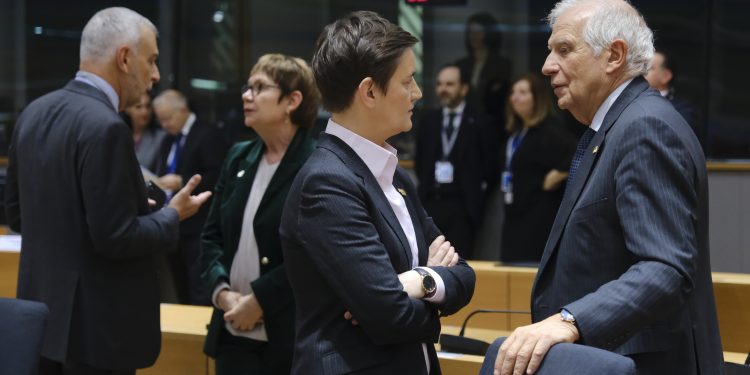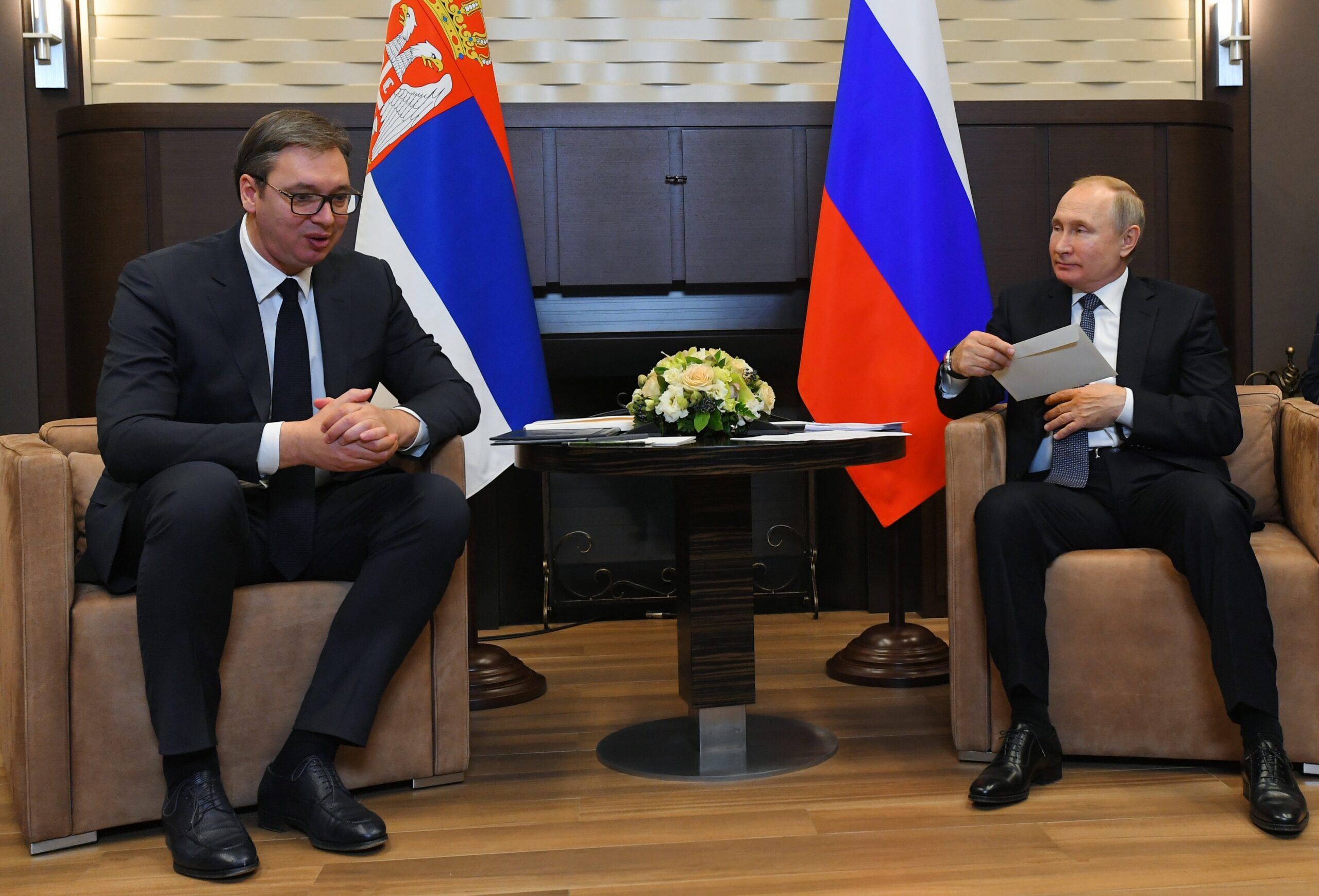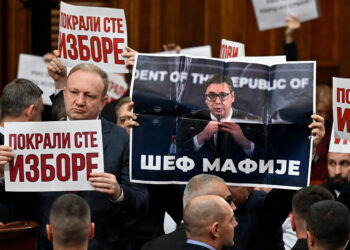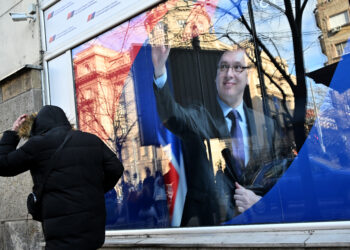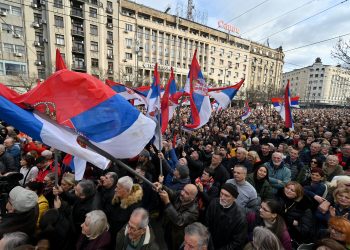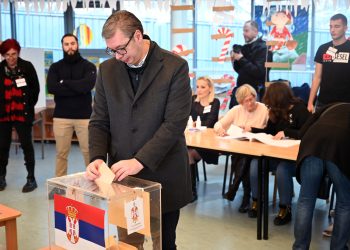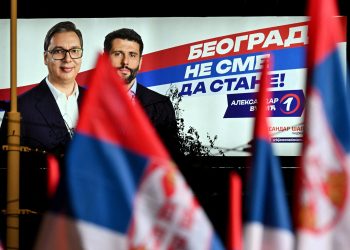Brussels – Serbia’s government breaks with European Union institutions, completely shutting the door on independent investigations into possible fraud in the Dec. 17, 2023 elections. “I will never allow an international investigation because it would require the nullification of national sovereignty,” Serbia’s acting Prime Minister, Ana Brnabić, made it clear in no uncertain terms during an interview with Serbian broadcaster Prva televizija: “It would suspend parliament, institutions, democracy, and end up bringing foreigners to power.”
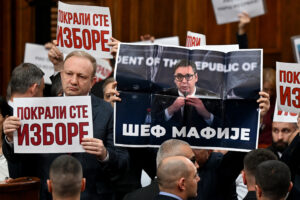
Harsh words, coming just over two weeks after the European Parliament resolution voted by an overwhelming majority, not only raised huge concerns about the rule of law in Serbia but also called for heavy-handed action from the commission should the involvement of the authorities and the outgoing government in election fraud be established. “Not a single vote has been stolen,” Prime Minister Brnabić responded dryly, attacking MEPs and oppositions in the country: “Apparently, they are now turning to the European Commission to fantasize about what the investigation should look like, they not only want to erase our sovereignty but also suspend institutions and national law.” With a counter-attack on the call for opening databases to check the regular registration of eligible voters: “How can you stay in opposition making foreigners ask for checks such as counting how many people live in an apartment or house?“
The joint resolution of the European Parliament had urged the EU Commission to “launch an initiative to send an expert mission to Serbia to assess the situation” related to early elections last Dec. 17 and post-election developments, paying particular attention to the “systematic fraud that compromised the integrity” of the election round and the interference of the President of the Republic, Aleksandar Vučić, in support of his Serbian Progressive Party (SNS). For this reason, the EU mission should be accompanied by an “independent international investigation” into “irregularities in parliamentary, provincial, and municipal elections,” particularly for the Belgrade Assembly. If the Serbian authorities fail to implement the election recommendations “or if the results of this investigation indicate that they are directly involved in electoral fraud,” the EU executive itself should consider a “suspension of EU funding based on serious violations of the rule of law” and, by implication, a possible halt to accession negotiations: “They should only move forward if the country makes significant progress in EU-related reforms.”
Tensions in Serbia after early elections
.
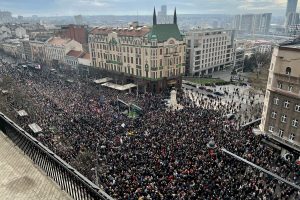
Despite high expectations on the eve of the elections from the “Serbia Against Violence” coalition, the Serbian Progressive Party won again in early elections with 46.67 per cent of the vote, trailing by 23 per cent the very united opposition that came in second place. In the face of fraud and numerous illegal actions at the ballot box, thousands of people took to the streets responding to the call of the parties and movements that had translated into political (pro-European) demands the street protests against the climate that led to the May shootout. The Organization for Security and Cooperation in Europe (OSCE)-led election observation mission, in which members of the European Parliament also participated, also noted “the misuse of public resources, the lack of separation between official functions and campaign activities, as well as intimidation and pressure on voters, including cases of vote-buying.” Nearly a month after the early elections, protests against fraud by the ruling party continue, particularly in Belgrade.
In the capital itself, the situation still remains tense, and the possibility of a repeat of the local elections, whose victory was claimed by the Serbian Progressive Party, cannot be ruled out: the party led in Belgrade by the pro-Russian Aleksandar Šapić won 49 seats (out of 110), which, however, would not be enough to control the City Assembly with the support of the far-right Russophile nationalist party “We, the Voice of the People” of Branimir Nestorović alone. The coalition “Serbia Against Violence” denounced that over 40 thousand people who arrived from Republika Srpska (the Serb-majority entity of Bosnia and Herzegovina) had voted in Belgrade without being formally registered as residents and demanded the annulment of the ballot result, explicitly speaking of “electoral theft.” The same complaint came from MEP and member of the parliamentary delegation Viola von Cramon-Taubadel (Greens/Ale): “We have seen cases of organized transportation of voters from Republika Srpska and intimidation of voters.”
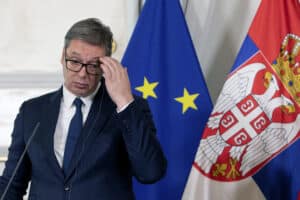
The President of Serbia, Aleksandar Vučić (credits: Alex Halada/Afp)
Added to this is the case that Brussels “is following closely” (words of the EU Commission’s spokeswoman for Neighborhood Policy and Enlargement, Ana Pisonero) over the violence suffered by the leader of the opposition Republican Party, Nikola Sandulović, who was picked up by Serbian intelligence services on Jan. 3 and severely beaten in detention for paying homage at the grave of Adem Jashari, one of the founders of the Kosovo Liberation Army (UCK). Members of the Serbian Security Information Agency (BIA) allegedly abducted and tortured Sandulović, who was then detained in Belgrade’s central prison without access to independent medical care. Among those responsible for the violence there would also be Milan Radoičić, deputy head of Lista Srpska (the main party representing the Serb minority in Kosovo and closely controlled by President Vučić) who, among other things, has already admitted to organizing the armed attack in northern Kosovo in late September last year. The former head of Serbian intelligence (who resigned two months ago), Aleksandar Vulin, reportedly personally ordered Sandulović’s arrest, but the defence lawyer pointed the finger at President Vučić.
Find more insights on the Balkan region in the newsletter BarBalcani hosted by Eunews
English version by the Translation Service of Withub